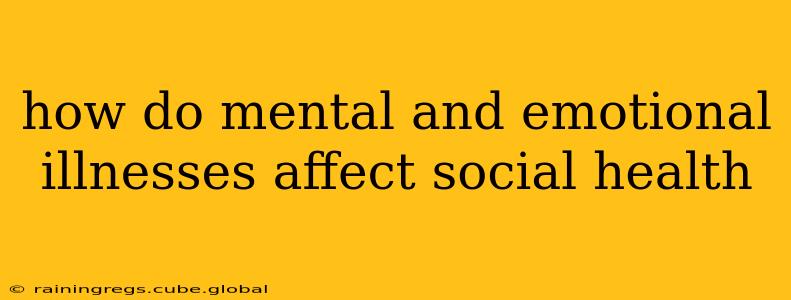Mental and emotional illnesses significantly impact social health, often hindering an individual's ability to build and maintain healthy relationships, participate in community activities, and contribute to society. The effects are multifaceted and vary depending on the specific illness, its severity, and the individual's coping mechanisms. Understanding these impacts is crucial for fostering supportive environments and promoting effective treatment.
What is Social Health?
Before delving into the effects, it's important to define social health. Social health encompasses our ability to form and maintain healthy relationships, build strong social networks, contribute to our communities, and adapt to various social situations. It's about feeling connected, supported, and valued within our social circles. A strong social network is a crucial component of overall well-being.
How Mental Illness Impacts Social Interactions
Many mental illnesses directly affect social functioning. Let's explore some key ways:
1. Social Isolation and Withdrawal:
- Depression and Anxiety: These conditions often lead to social isolation, as individuals may feel overwhelmed, fatigued, or lack the energy to engage in social activities. Fear of judgment or negative social interactions further exacerbates withdrawal.
- Schizophrenia: Positive symptoms like hallucinations and delusions can impair social interaction, making it difficult to connect with others on a meaningful level. Negative symptoms such as flat affect and avolition can also lead to social withdrawal.
- Autism Spectrum Disorder (ASD): Challenges with social communication and interaction are a core feature of ASD, impacting the ability to understand social cues, engage in reciprocal conversations, and build relationships.
2. Impaired Communication and Relationship Dynamics:
- Bipolar Disorder: Mood swings characteristic of bipolar disorder can strain relationships, leading to misunderstandings and conflict. During manic episodes, individuals may exhibit impulsive or erratic behavior, damaging trust and intimacy.
- Personality Disorders: Certain personality disorders, such as antisocial personality disorder, can significantly impair social functioning due to a lack of empathy, disregard for social norms, and manipulative behavior. This can lead to strained relationships and difficulty maintaining social connections.
- Obsessive-Compulsive Disorder (OCD): The intrusive thoughts and compulsive behaviors associated with OCD can consume significant time and energy, leaving less time and emotional capacity for social interactions.
3. Stigma and Discrimination:
The stigma surrounding mental illness creates significant barriers to social participation. Individuals may fear judgment, discrimination, or rejection, leading to self-isolation and reluctance to seek help or engage with others. This stigma can impact employment opportunities, housing options, and overall social inclusion.
How Emotional Illnesses Affect Social Health
Emotional illnesses, often intertwined with mental illnesses, also profoundly impact social health.
1. Difficulty Regulating Emotions:
Conditions like borderline personality disorder (BPD) can make it challenging to regulate emotions, leading to unpredictable emotional outbursts, intense interpersonal conflicts, and difficulties maintaining stable relationships.
2. Emotional Dysregulation:
Emotional dysregulation impacts a person's ability to respond appropriately in social settings. Individuals might struggle with managing their emotional responses to stress, resulting in avoidance of social situations or reactive behaviors that strain relationships.
How to Support Individuals with Mental and Emotional Illnesses
Supporting individuals with mental and emotional illnesses involves fostering understanding, empathy, and creating inclusive environments. This includes:
- Reducing Stigma: Openly discussing mental health and challenging negative stereotypes is crucial.
- Promoting Early Intervention: Early diagnosis and treatment are critical in mitigating the long-term effects of mental and emotional illnesses on social health.
- Providing Support Groups and Resources: Connecting individuals with peer support groups and mental health professionals can provide valuable support and coping strategies.
- Creating Inclusive Communities: Building communities that value diversity and embrace individuals with mental and emotional illnesses promotes social inclusion and reduces isolation.
Frequently Asked Questions
Can mental illness cause social anxiety?
Yes, several mental illnesses, including generalized anxiety disorder, social anxiety disorder, and depression, can significantly contribute to social anxiety. The fear of social judgment or negative evaluation can become overwhelming, making social situations extremely distressing.
How does depression affect social relationships?
Depression often leads to social withdrawal, reduced communication, and a decreased desire for social interaction. It can also impact emotional availability and the ability to engage in meaningful relationships.
What are the long-term effects of social isolation on mental health?
Chronic social isolation can significantly worsen existing mental health conditions and increase the risk of developing new ones. It's linked to increased rates of depression, anxiety, and even physical health problems.
How can I help someone struggling with a mental illness improve their social health?
Encourage professional help, offer consistent support (without enabling unhealthy behaviors), join them in activities they enjoy, and be patient and understanding. Remember to prioritize your own well-being while providing support.
In conclusion, mental and emotional illnesses have profound and multifaceted impacts on social health. By understanding these impacts and actively working to reduce stigma, provide support, and foster inclusive communities, we can help individuals thrive and build fulfilling social lives despite the challenges they face.
